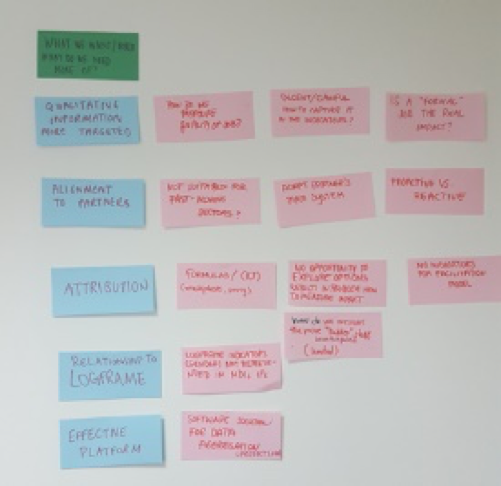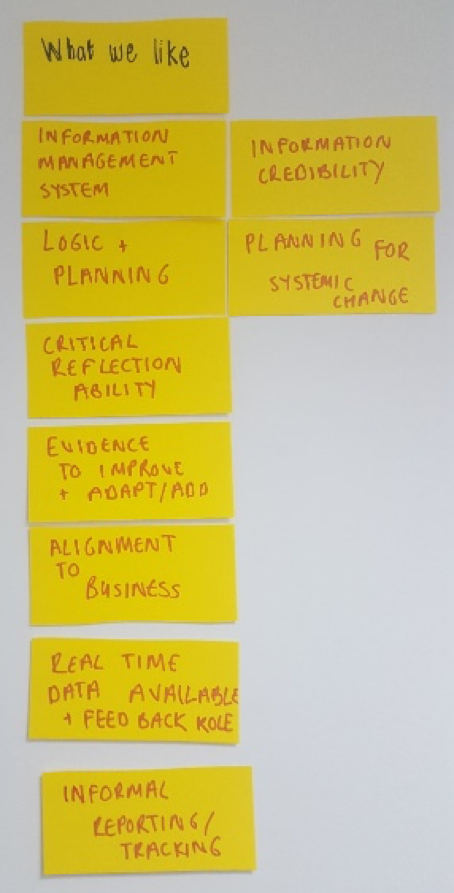Hi All! I am Kirsten Mulcahy, an evaluator at the economic-consulting firm Genesis Analytics, based in South Africa.
As evaluators, we are often called to insert ourselves seamlessly into different countries, cultures and organisations without contributing to bias. Yet we must still engage appropriately with prevailing perspectives in order to extract useful information. In two projects, our evaluation team used an Appreciative Inquiry (AI) technique to assist in overcoming hindering organisational cultures of entities in Bosnia and Herzegovina (BiH) and South Africa (SA). In both organisations, their narrative of change was steeped in negativity – in BiH due to fatigue with respect to monitoring and results measurement (MRM) systems; and in SA due to external influence and poor performance within the government organisation.
Lessons Learned:
- AI is an action science which moves from theory into the creative; from scientific rules into social constructions of shared meaning. Using this participatory and positivist approach helped us to challenge the existing organisational discourse to achieve improved buy-in, and creative, actionable, solutions for both projects.
- The language used influences the extent of the response. We have found that language of deficit sees much shorter and closed responses, while a positive-framing yields more insightful, lengthier and balanced replies. In the SA AI session, actively seeking the positive actually yielded uninhibited input on challenges and failures.
- AI is created as a 4-D model (Discovery, Dream, Design and Destiny) but when using AI in an evaluation, we found it more useful to focus your energy on Discovery and Dream with a lesser focus on Design and perhaps not unpacking Destiny until later (if at all).
- The AI discussion findings should be used to develop the evaluation framework. For example, in BiH decision-making and learning emerged as two critical components to research. Exploring these components improved the relevance, focus and practicality of our recommendations; thus, improving likelihood of future utilization.
Hot Tips:
- Make your intention for the session clear: it shouldn’t be a secret that you are following a positivist approach.
- The AI session should be held post the theory of change workshop: the organisation team are then already aligned in vision, and can begin unpacking how to achieve their ‘best selves’.
- Make the sessions as visual and interactive as possible: Understand that introverts and extroverts engage in group situations differently, and incorporate a combination of pair-based activities as well as group activities.
- This paper is part of the AEA Evaluation 2017 conference Learning to Action across International Evaluation: Culture and Community Perspectives panel that is scheduled for 16:30 on 9th November 2017; under the topical interest group (TIG) International and Cross Cultural Evaluation.
Rad Resources:
- For the philosophers, looking to understand the origins: here
- For the pragmatists, looking to apply AI in evaluation: article, book and website
- For the millennials, looking for a summary: here
The American Evaluation Association is celebrating International and Cross-Cultural (ICCE) TIG Week with our colleagues in the International and Cross-Cultural Topical Interest Group. The contributions all this week to aea365 come from our ICCE TIG members. Do you have questions, concerns, kudos, or content to extend this aea365 contribution? Please add them in the comments section for this post on the aea365 webpage so that we may enrich our community of practice. Would you like to submit an aea365 Tip? Please send a note of interest to aea365@eval.org. aea365 is sponsored by the American Evaluation Association and provides a Tip-a-Day by and for evaluators.



